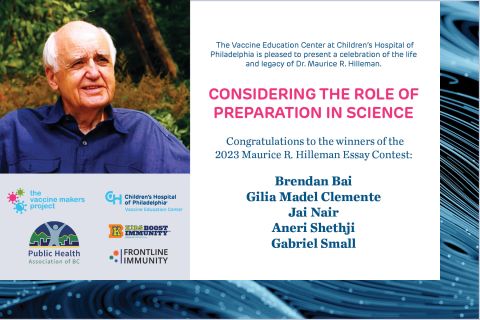Considering the Role of Preparation in Science: Celebrating the 2023 MRH Essay Contest Winners

The Vaccine Education Center at Children’s Hospital of Philadelphia (VEC), in collaboration with our partners, the Public Health Association of British Columbia, Kids Boost Immunity, and Frontline Immunity, are pleased to announce the winners of the 2023 Maurice R Hilleman Essay Contest. Five winners were celebrated during a virtual event hosted by Dr. Paul Offit, VEC Director and Dr. Hilleman biographer. The students composed their essays in response to the writing prompt, “Preparedness is an important component of science as demonstrated by Maurice Hilleman when he identified the 1957 influenza pandemic. How is preparedness critical in science today?”
Brendan Bai and Gilia Madel Clemente were the winners from Canada, and Jai Nair, Aneri Shethji, and Gabriel Small were the winners from the U.S.
In their consideration of the role of preparedness of science, the students each made unique and timely observations:
- Brendan Bai discussed the roles of preventative research and communication in science, noting, “One of the most essential things with preparation is preventive research. Presence of mind and proactivity enable researchers to prepare for impending challenges, such as virus mutations, and mass outbreaks during a pandemic.” He looked to Dr. Hilleman’s work for “A perfect example of preventive research” but also found that “Preparedness is not just about preparing scientists. It is preparing the public as well.”
- Gilia Madel Clemente examined the risks and rewards of preparation in science, writing, “Preparedness, if sustained, can be a light that will always lead us to greatness and discoveries, but if forgotten, it can also be a shadow of darkness that will seize mankind rapidly.” But she encouraged us to persevere because, “Although we can't predict what will happen tomorrow, that doesn't mean we can't take action today…. Science is more than just a field; it is a perpetual struggle with the unknowable, and preparedness combined with science makes breakthroughs possible.”
- Jai Nair looked to giants of science like Drs. Hilleman, Salk, Karikó, and Weissman as he considered the words of famed inventor Alexander Graham Bell, “Before anything else, preparation is the key to success.” Jai noted that “Preparedness is now a global campaign” because “This common enemy of infectious diseases does not see country boundaries and different socio-political backgrounds and attacks without purpose or intent. We need to be prepared to coordinate and fight back together to win the war against these microscopic threats.”
- Aneri Shethji described how preparedness “illuminates the path for scientists as they navigate through the vast landscapes of uncertainty.” She looked to the past and the future for examples that demonstrate the importance of preparedness. For example, she described how Dr. Hilleman’s achievements and the response to the eruption of Mount Pinatubo demonstrated “how preparedness proved pivotal in developing response strategies.” And she looked to its importance in the future as she wrote, “The path to responsible and beneficial AI lies in our ability to recognize the importance of preparedness and take the necessary steps to shape its development in a way that aligns with humanity’s values and aspirations.”
- Gabriel Small focused on preparing people for science. He examined steps taken during the COVID-19 pandemic and found that “The real danger which nobody prepared for was the power of vaccine misinformation.” He remains hopeful, saying “Preparedness is critical in science today, as it minimizes the casualties for future events, whether pandemics or droughts. Hand in hand with the technology though, lie the people who are to use such technology, which is why scientific education is paramount to preparedness. We can learn from our mistakes in the past, and use them to power us forward, leaving us super-prepared for the future.”
During the event, which marked the fifth year of the contest, Dr. Hilleman’s wife, Lorraine, made personal remarks to recognize each student. Dr. Marion Gruber, Vice President for Public Health and Regulatory Science at the International AIDS Vaccine Initiative (IAVI), delivered the keynote address, and Tara Jo Holmberg, president of the National Association of Biology Teachers (NABT) and Craig Thompson from the Public Health Association of British Columbia also offered remarks. Along with presenting their winning essays during the event, the students also attended an informal virtual gathering prior to the celebration for an opportunity to meet and converse with the event speakers.
Teachers named in each student’s winning entry received a signed copy of Pandora’s Lab: Seven Stories of Science Gone Wrong, written by Paul A. Offit, MD, and a 1-year, complimentary membership to the National Association of Biology Teachers, graciously provided by NABT.
Read the 2023 winning essays here.
Learn more about the event keynote speaker, Dr. Marion Gruber.
Learn more about Dr. Hilleman’s life and work.
